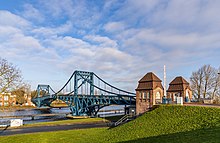Kaiser Wilhelm Bridge
This article needs additional citations for verification. (January 2024) |

The Kaiser Wilhelm Bridge (German: Kaiser-Wilhelm-Brücke or "Emperor William Bridge") is a swing bridge in Wilhelmshaven, Germany, and the town's landmark.
Location[edit]
The Kaiser Wilhelm Bridge connects the beach (Südstrandpromenade) with the South Quarter.
History[edit]
Construction began in 1905, and at its completion in 1907 it was Europe's longest swing bridge. The design scheme was created by Ernst Troschel, construction was executed by MAN Nuremberg.[1]
In 1998 the rotary mechanics of the southern part of the bridge were damaged when a tugboat collided with a frigate and had to be partially repaired. In 2003, a cargo ship rammed and slightly damaged the bridge.
From September 2010 to September 2013, the bridge was closed to the public for repairs.
Specifications[edit]

The bridge has a length of 159 metres (522 ft) and a width of 8 m. The two pillars are 20.4 m tall. The maximum passage height is 9.00 m at + 1.10 m medium water-level in the harbour, the passage width is 58.60 m.
On the bridge the road traffic can only drive one way at the same time. It is controlled by traffic lights. Before it tilts out the bridge is blocked for the whole traffic by light signals and pikes.
Postage stamp[edit]
In 2007, Deutsche Post released a 1.45-euro stamp to commemorate the centennial of the bridge.
References[edit]
- ^ "Kaiser Wilhelm Bridge – Wilhelmshaven, Germany - Atlas Obscura". Atlas Obscura. Archived from the original on November 19, 2022. Retrieved January 15, 2024.
External links[edit]
![]() Media related to Kaiser Wilhelm Bridge at Wikimedia Commons
Media related to Kaiser Wilhelm Bridge at Wikimedia Commons
This article was translated from the German Wikipedia article on December 15, 2006.
53°30′49″N 8°08′07″E / 53.51361°N 8.13528°E
